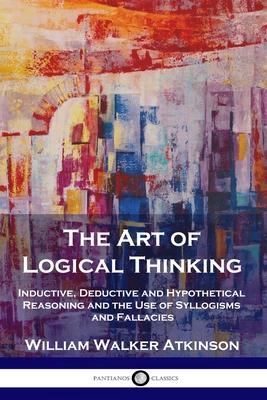The Art of Logical Thinking: Inductive, Deductive and Hypothetical Reasoning and the Use of Syllogisms and Fallacies
De (autor): William Walker Atkinson

The Art of Logical Thinking: Inductive, Deductive and Hypothetical Reasoning and the Use of Syllogisms and Fallacies
De (autor): William Walker Atkinson
William Walker Atkinson, an attorney by trade, explains different kinds of logic and reasoning - deductive, inductive and hypothetical.
The author begins by describing how the mind forms ideas and concepts, and then subjects these to the mental processes of higher reasoning. The memory stores a repository of terms, which are different from concepts in that they apply exclusively to the name of things. Through reasoning the mind can arrive at a judgment of a given thing or idea, and through simple distinction can reject what is false - for instance, the notion that a horse is a cow.
Moving on from these simple examples, Atkinson describes how complex judgments and analyses are formed by the mind. Piecing together an accurate chain of events forms a kind of inductive reasoning - for example, if several people enters a store empty-handed, and later emerge with bags of fruit and vegetables, is it sensible to infer that it is a grocery store. Deriving conclusions from facts and events is forming a hypothesis; with the use of information, assertions can be made to arrive at a sensible conclusion - without personally entering said store, based on known facts it is credible to hypothesize that it sells groceries.
-10%
transport gratuit
PRP: 74.23 Lei
Acesta este Pretul Recomandat de Producator. Pretul de vanzare al produsului este afisat mai jos.
66.81Lei
66.81Lei
74.23 LeiPrimesti 66 puncte

Primesti puncte de fidelitate dupa fiecare comanda! 100 puncte de fidelitate reprezinta 1 leu. Foloseste-le la viitoarele achizitii!
Livrare in 2-4 saptamani
Pentru a putea comanda rapid este nevoie sa introduceti numarul dvs de telefon in formatul 0xxxxxxxxx (10 cifre).Un operator Libris.ro va suna si va cere telefonic restul datelor necesare.
Descrierea produsului
William Walker Atkinson, an attorney by trade, explains different kinds of logic and reasoning - deductive, inductive and hypothetical.
The author begins by describing how the mind forms ideas and concepts, and then subjects these to the mental processes of higher reasoning. The memory stores a repository of terms, which are different from concepts in that they apply exclusively to the name of things. Through reasoning the mind can arrive at a judgment of a given thing or idea, and through simple distinction can reject what is false - for instance, the notion that a horse is a cow.
Moving on from these simple examples, Atkinson describes how complex judgments and analyses are formed by the mind. Piecing together an accurate chain of events forms a kind of inductive reasoning - for example, if several people enters a store empty-handed, and later emerge with bags of fruit and vegetables, is it sensible to infer that it is a grocery store. Deriving conclusions from facts and events is forming a hypothesis; with the use of information, assertions can be made to arrive at a sensible conclusion - without personally entering said store, based on known facts it is credible to hypothesize that it sells groceries.
Detaliile produsului
De pe acelasi raft
De acelasi autor
Parerea ta e inspiratie pentru comunitatea Libris!







